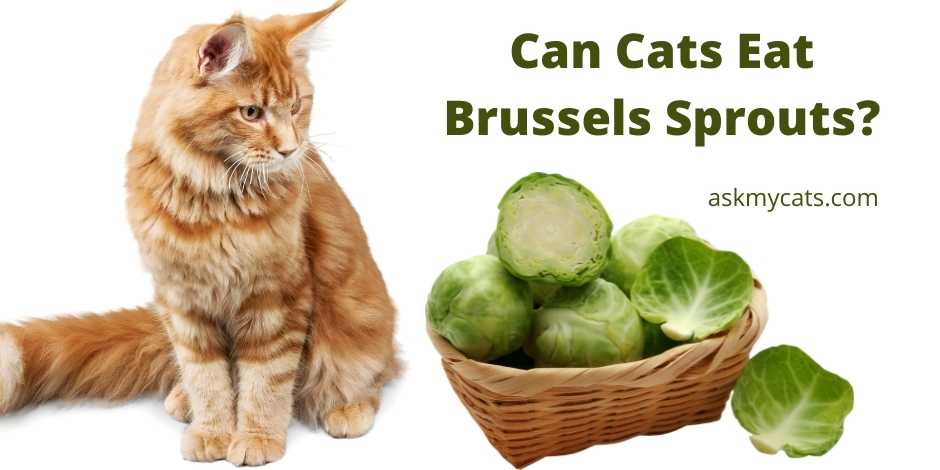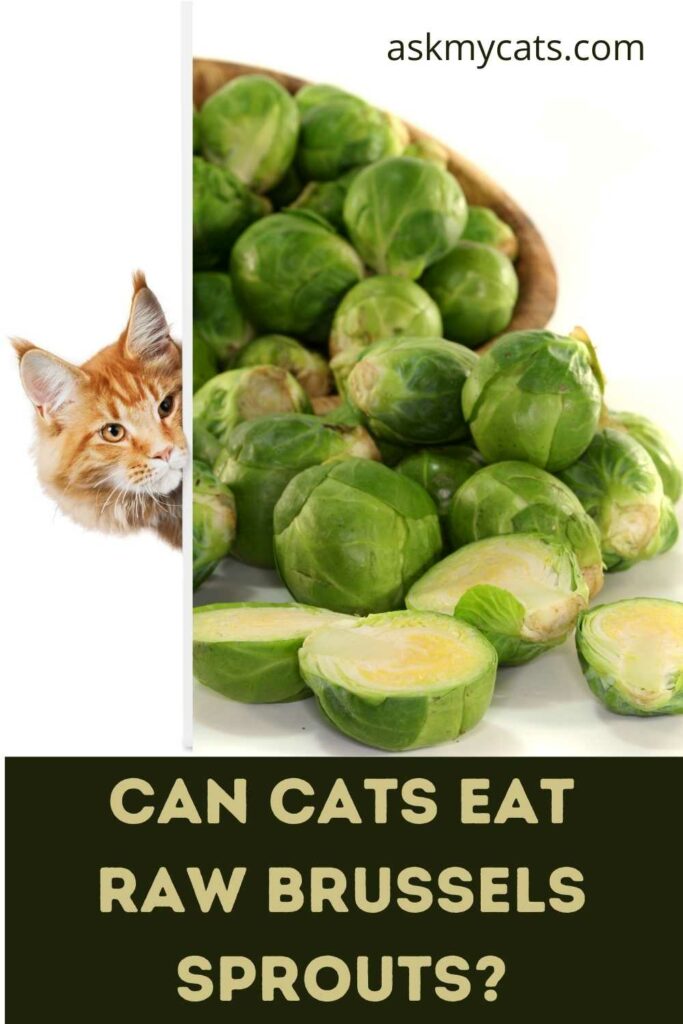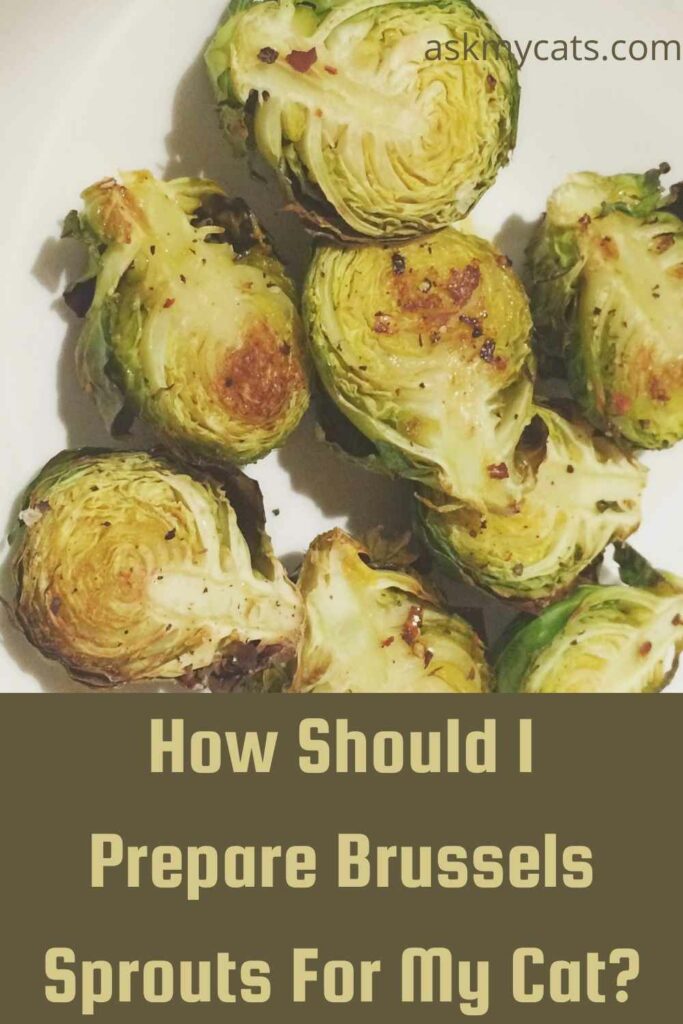Cats have descended from a group of creatures known as carnivores. Their main source of nutrition comes from consuming meat. Greens, on the other hand, must be included in their diet to provide roughage and vitamins.
Yes, cats can eat brussels sprouts. Brussels sprouts, among other vegetables, are acceptable for cats to eat.
When added to a cat’s everyday diet, sprouts are better known as mini-powerhouses of nutrients. Rather than eating a whole grain, brussels sprouts are the way to go.
Sprouts have a far higher nutritional content than their counterparts and are a fantastic addition to any meal. It may also be topped with pre-packaged meals to get the same effect.
If you want to learn more about the benefits of brussels sprouts on your feline, keep reading!


Give Your Cat the Perfect Day
Get the Free Ebook!
Do Cats Like Brussels Sprouts?
Brussels sprouts are high in vitamin C and vitamin K and are a good source of nutrition. Many cats, on the other hand, are not interested in eating them.
If they want a bite of the healthy green, make sure it’s soft and tiny enough for them to swallow without choking.
Is It Safe For Cats To Have Brussels Sprouts?
Yes, Brussels sprouts are safe for cats. However, they should be consumed by your feline only in moderation.
Aside from the fact that it is toxic-free, it is important to note that Brussels sprouts may not be as safe as completely green vegetables.
When it comes to the cultivation of Brussels, there are certain dangers involved. Sprouts are cultivated in a humidified and warm atmosphere.
The quantity of moisture used throughout the development phase creates a perfect setting for bacterial sporulation, which can vary from mild to deadly. There is always the risk of food-borne disease when consuming Brussels sprouts.
As a result, it’s critical to monitor your cats’ health beginning with sprout eating. Any sign of food poisoning should be treated as soon as possible.
Are Brussels Sprouts Toxic To Cats?
No, Brussels sprouts are not toxic to cats. Brussels sprouts are safe for cats to consume.
The majority of the time, the cat owner is concerned about the hazardous contents of organic food. They are, however, non-poisonous and will not cause any toxicity.
It would, however, not be incorrect to rule out the possibility of poisoning from sprouts or any other portion intended for eating by cats. Furthermore, it may provide a lot of nutritional value to the cat while also improving its health.
Can Cats Eat Raw Brussels Sprouts?
No, cats should not eat raw brussels sprouts. The use of raw sprouts increases the risk of infection.

Therefore the cat should be checked for signs of food poisoning on a frequent basis, if they consume raw brussels sprouts.
Any indications of diarrhea or dysentery might indicate a bacterial illness. Many of the cats will exhibit no early symptoms and will take up to seventy-two hours or three days before showing any apparent signs of illness.
The following are the symptoms:
- Stomach ache
- Vomiting
- Diarrhea
- Muscle spasms
- Fever
Vomiting is a catch-all symptom that might indicate either food poisoning or poisoning in general. The cat may vomit in response to sprouts without being really ill. We suggest that you examine for additional symptoms and vital signs.
In the event of a major problem, one should seek medical attention from a veterinarian. In this instance, the accurate diagnosis and subsequent therapy will be the best course of action.
Can Cats Eat Cooked Brussels Sprouts?
While cats do not require vegetables in their diet, they may be a safe and nutritious treat.
Cats can eat cooked brussels sprouts. Because felines, like humans, lack the ability to break down plant cell walls, brussels sprouts should be cooked or steamed.
We recommend that this meal be prepared and fed to them in a crushed shape for easier digestion. It is also necessary to boil it in order to retain its softness when ingested in order to avoid the risk of choking a cat.
What Are The Health Benefits Of Brussels Sprout To Cats?
Brussels sprouts are a cabbage-like vegetable that contains substantial amounts of vitamin C and vitamin K. However, cats rarely consume them.
As a result, whatever quantity of sprouts they ingest, they must be prepared as little soft pellets that are easy for cats to chew without choking.
We’re not strangers to vegetables providing health advantages. Here are some of the nutrients that brussels sprouts provide:
- Vitamins, which include Vitamin C, K, and B
- Proteins
- Fibers, which when used in moderation, aids digestion and prevents diarrhea and constipation.
- Minerals
- Antioxidants, that have the ability to neutralise harmful chemicals. It aids in the treatment of diseases, chronic illnesses and lowers the risk of cancer in cats.
How Should I Prepare Brussels Sprouts For My Cat?

Over time, a cat’s diet can be changed to include healthier alternatives such as brussels sprouts. When giving Brussels sprouts to your cat, don’t combine them with other fruits or vegetables.
One vegetable at a time can assist you in observing results, particularly any negative health implications.
Some pets may have a bad reaction to the new brussels intake, resulting in a diarrheal epidemic. So, it is best to introduce it in moderate amounts at first.
Brussels sprouts should be prepared and fed to them in a crushed shape for easier digestion. It is also necessary to boil it in order to retain its softness when ingested and avoid the risk of choking a cat.
The easiest method to prepare Brussels sprouts is to follow these easy steps:
- Remove the buds off the stem using a knife.
- Pick the buds that are tiny and even in size.
- To help with heating, make a central or cross-cut in the centre. Cross-cut may trap water, so be careful with it.
- Remove the excess stem and clip it off.
- Remove any loose leaves from the surface.
- The buds should be cleaned and washed.
- Begin by boiling, steaming, or grilling your food.
- Avoid overcooking.
- Slow cook, frying, and roasting are all options.
In the case of cats, toppings should be avoided.
Frequently Asked Questions
What Kind Of Sprouts Can Cats Eat?
Sprouts such as pea, broccoli, radish, clover, and sunflower are just a few examples of what you may give your cat.
Should Cats Have Vegetables?
Vegetables aren’t required in your cat’s diet to stay healthy. However, they do provide an excellent substitute for high-calorie snacks.
Which Foods Are Poisonous To Cats?
Onions
Garlic
Raw eggs and raw meat
Caffeinated drinks
Milk and dairy products
Final Words
Sprouts may not be required for a cats’ survival. So whether you feed it or not is always a question of personal preference. However, as part of a balanced diet, they can be included in little amounts every now and again.
They will, on the other hand, provide a significant quantity of fibre and vitamins to the diet, making your cat healthy and immune, and therefore giving long-term health advantages.
However, keep an eye out for signs of food illness and get treatment as soon as possible. Remember to keep an eye out for indications of food poisoning and visit the veterinarian immediately if you notice any health problems.
We request you to drop down your queries regarding your furry friend’s eating habits in the comment section below. We will answer them soon.
